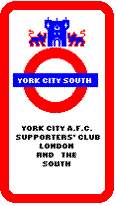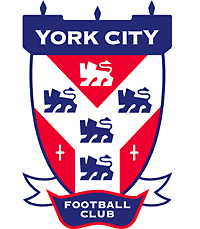

|
YORK CITY SOUTH |
2016/7 - Accounts Operating loss shows spend and income during the financial year. In addition, interest payable on accumulated losses was £469,110, meaning a loss before taxation of £969,475, as per the published accounts. The accounts stated the loan balance, including accrued interest, with JM Packaging to be £5.8m, or, without the accrued interest, which JMP have stated they will not collect is £4.5m.
With decreased central funding in our first season outside The Football League, the cost of running a squad which saw a record number of players turn out for City as Jackie McNamara and Gary Mills, with a top 3 budget, failed to fight off relegation to National League North, was a major contribution to the losses.
Even the additional income from The FA Trophy success failed to make a significant dent in the losses. Wages were 87% of turnover whilst Peter Rookes stated it costs about £500,000 evey year to maintain Bootham Crescent.
2016/7 losses were broadly similar to 2015/6, the most recent Football League season when they were stated at £300,661, after a donation of £235,000 from JM Packaging was included (or presumably £535k if the JMP donation was stripped out).
YCFC statement
Read More York Press article Read More The figures mean that Jason McGill, the club’s 75 per cent majority shareholder has, up to June 30, 2017, "pumped" £4 million into the club to cover the losses since he took over ownership from the Trust in 2006. The debt owing to the chairman's company was £1.856m at July 1, 2011 and £5.809m at June 30, 2017 (including interest McGill has agreed to waive).
Equity (as per the most recent, albeit old, valuation), in Bootham Crescent is not now at a sufficient level to guarantee McGill will receive all the money he has put into the club following the sale of the ground ahead of the move to the Community Stadium.
Further information to be taken from accounts filed at Companies House. Some Thoughts Footnote: On 21st January 2018, City issued a press release stating that Jason McGill and JMP Packaging had contributed a further £630,000 to support City's finances in the following year which saw City relegated from The National League. Read the Yorkpress article (22/Jan/18) on Jason McGill's statement. Steve Kilmartin (YCFC Auditor) on Radio York (22/Jan/18). John Lacy on Radio York (22/Jan/18). Jason McGill on Radio York (22/Jan/18). Jason McGill's comments to John Uttley (27/Jan/18). YCFC Statement
City's statement of 6th April 2018 detaling the 2016/7 accounts is re-produced below.
The York City accounts for the year ended 30 June 2017 have been finalised and filed at Companies House.
These figures cover the 2016/17 season in which the team was relegated to the National League North but include the visit to Wembley for the FA Trophy win in May 2017.
The accounts show that the Club made an operating loss for the year of around £500,000 compared to £300,000 in 2016 and £360,000 in 2015.
Peter Rookes, York City’s Financial Management Consultant, commented: “These financial results show a larger loss in 2017 than 2016. The reduction in parachute payment from the Football League was offset slightly by the prize money from getting to the FA Trophy final, however overall income from central funding, donations, transfer fees and sponsorship was reduced by around £310,000.
"Reduced attendances (2016/17 average 2,570, compared to 3,218 in 2015/16) also meant a reduction in net gate income though this was slightly offset by gate income from the FA Trophy final meaning a net reduction of around £140,000.
"The consequence of this reduced income meant a reduction in playing costs was necessary and overall these were reduced by around £265,000.
A small increase in the general overheads of around £15,000 meant that the overall operating loss increased to £500,000.”
Rookes added: “In 2017/18 the central funding was reduced by a further £240,000 and in 2018/19, the last at Bootham Crescent, it is expected that together with the loss of Youth funding, there will be a further shortfall of £500,000. The overall reduction in central funding from 2015/16 to 2018/19 is expected to be around £1,000,000.
"Many of the general costs are relatively fixed and the club expects to have ongoing running costs at Bootham Crescent of around £500,000 per annum. Trying to offset this reduction in funding, whilst maintaining a playing budget to meet the supporter’s expectations will be a mammoth task for the new club board.
"As in previous years, the major expense for the club was wages. The total income during the financial year was £2,167,768 and playing costs including player and football management wages, bonuses as well as administration and match day wages in total represent around 87% of income, a slight increase from 82% in 2016, which is due to the fact that wage costs have not reduced as much as income.
"As usual, the accounts show no salaries or expenses were taken by City’s Board of Directors
"The support of JM Packaging Limited continued throughout the year and at 30 June 2017 the loan balance, including accrued interest, with JM Packaging was £5.8m.
"Following the changes previously announced, the new Board will seek to increase income and reduce costs although with vastly reduced income and the move from Bootham Crescent still over a year away, the size of this task should not be underestimated and 2018/19 is expected to be a challenging season.”
For the same 2016/7 season, Harrogate recorded “turnover” of £336k and “Other Income” of £216k, probably totalling around one fifth of City’s total income. Whilst Harrogate recorded a lose of £432k, this was more than offset by the £554k cost of their artificial pitch.
Harrogate’s “turnover” can be broken down as £120k from gate receipts, £78k from sponsorship and advertising and £4k from merchandise sales. However, the biggest single turnover component was £133k from bar and catering sales. That’s right, Harrogate take more on food and drink than through the turnstiles.
There were 2 slightly conflicting statements re City's 2016/7 accounts. The published accounts (released in April 2018) showed an operating loss £500,365 (with no mention of any JMP donation). Headline figures for the 2016/7 accounts were earlier made public in January 2018, in advance of final figures being lodged at Companies House, in the run up to The York City Supporters’ Trust’ AGM when, it was revealed that Jason McGill has pumped in £630,000 to cover the 2016/7 operating losses. The operating loss was stated at £300k and the JMP donation as £330k. At the fans forum held in November 2016 at York Sports Club, Jason McGill said he believed York's budget was in the top three in the National League and that he was personally funding 50% of the day-to-day running of the club.
Home
City History
Email Us